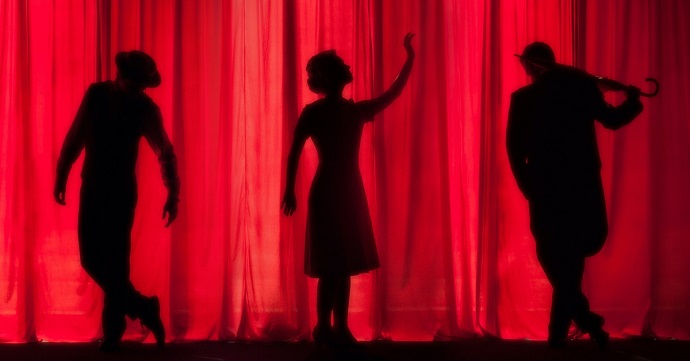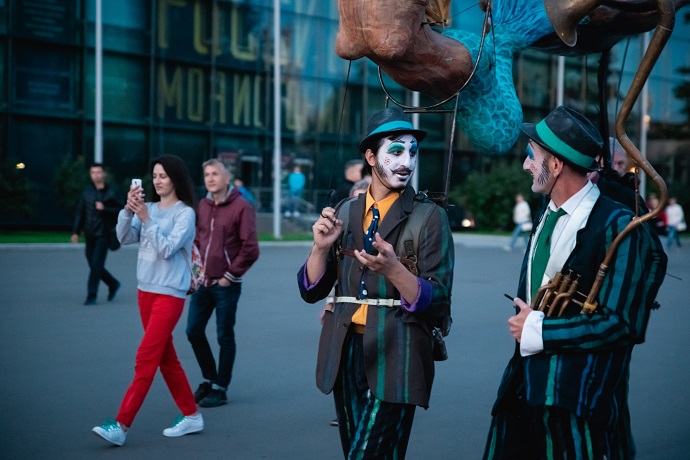
Newly Updated
Image: Siora Photography
No idea what to do next in your career change? Feeling trapped, frustrated and unable to make progress? There's a group of people who have made 'not-knowing and doing amazing things anyway' an art form. Natasha explains who they are, and how you can use their techniques to get your career change moving, too.
"It may be that when we no longer know what to do, we have come to our real work, and that when we no longer know which way to go, we have begun our real journey. The mind that is not baffled is not employed. The impeded stream is the one that sings." – Wendell Berry
Here's an uncomfortable thought: when it comes to your career change, there's a good chance you have no idea what you're doing.
I can be pretty sure of that, because I had no idea what I was doing when I made my own career change.
In fact, pretty much everyone looking for fulfilling work is stumbling around in the dark.
You have no idea what you're doing

You have no idea if you're making the right choices. You have no idea what would really light you up to wake up for every morning. You have no idea if you're just being wilfully, narcissistically greedy for wanting a career you love. You have no idea, once you figure out what you want to do, what you're going to do about that knowledge.
And you hate the not-knowing. You hate it, and you try to fight it, and you try to hide it.
It feels like walking on an icy pavement at rush hour in the city. All you want to do is get to the end of the road without falling head over heels, and you're trying so, so hard to make it there with your dignity intact.
You're slipping and sliding and all the muscles in your legs are working overtime to keep your balance, and all you want to do is throw your arms out to the sides and grab onto someone or something for support… and yet you don't want to look like a prize idiot, so you're exhausted and frustrated.
You want to know what you're doing. You want to have clarity and security and stride to the end of this slippery career change road confidently – and you don't want people to know how lost and off-balance you really are, because it's embarrassing.
It's lonely and embarrassing to feel so lost in such an important area of your life, especially when in almost every other area, you're a total pro.
And yet, here's the ridiculous part.
Nobody knows what they're doing

Everyone is slipping and sliding their way through life. Everyone you see on the street is on that icy pavement with you. Nobody knows what in the world they're doing.
Think about it. How much of life can anyone be absolutely certain of?
Beyond the sun rising in the mornings, beyond your house still standing when you come home from work, how much are you 100% sure of?
Do you know exactly how your day is going to go? Are you sure of what mood your friend will be in when you walk into the café to meet them? When you open your e-mail inbox, are you confident of what messages you'll find, and from who?
Day-to-day life is a practice in improvisation

We spend our lives, moment to moment, responding to what we're presented with and making it up on the spot. Of course, what we choose to do in each moment is often based on what we've experienced in the past, but in much of our lives, we're improvising. It's what keeps us moving forward. Without it, we'd be trapped.
"Improvisation basically is simply motion. It precedes musical knowledge or understanding about anything. It's simply the act – the courageous act of opening up your mouth or putting your fingers on a keyboard or whatever – of opening your mouth and simply singing something and following it. It's simply motion, just the courage to keep moving just to keep going, you know. What gets in the way is: Am I qualified to do this? Do I know enough to do this? Do I sound well enough to do this? – or whatever, you know. There are all kinds of excuses for you not to do it. Improvisation, I think, is so essential to having a well-rounded life." – Bobby McFerrin
And yet, when it comes to career change, we hate the idea of not being utterly clear about what's going to happen and how. We want to know exactly how things are going to go. We don't want to make a move unless we know how it's going to turn out. We wait for clarity, wait for the answers, wait for everything to be just so… and we find ourselves waiting forever.
And it's that hatred of the not-knowing that holds us back the most.
Fighting against not knowing what you're doing is a waste of energy
It's our rejection of improvisation that makes our progress on that slippery road so painful and slow. You spend all of your time focusing on the problem, because you don't know what the solution is. You beat yourself up constantly and come out feeling even less motivated, less inspired, less well equipped.
So the question is: how do you get really good at not knowing what you're doing?

How do you make progress as a result of being at a loss, rather than despite it?
In art, music, and theatre, improvisation isn't just something you do when you've forgotten your lines. It's considered a fundamental skill.
And if career change were an art (and for us at Careershifters, it is), the same applies.
The willingness and ability to improvise is what distinguishes successful career changers from those who stay stuck.
The ability to flow, freely and unfettered by plans and expectations (there's a reason Mihaly Csikszentmihalyi named his state of being 'flow').
The ability to take yourself just a touch less seriously, and allow yourself to play awhile.
The recognition of the fact that the best-laid plans are always a mess by the end of the game – the celebration, in fact, of not having all the answers.
There's a special magic to improvisation theatre, because audiences love to watch other human beings simply being, unfettered by expectation. We sit there and marvel: look how free they are! Look how responsive, how playful, how imaginative, how creative.
They're always balancing on the edge of screwing up, and they're happy there.
What would it feel like to be OK with having no idea what you're doing?

To give yourself permission to be completely without answers?
How would life change if you were to celebrate your state of not-knowing; to revel in it; to use it to your advantage?
"Mockingbirds are the true artists of the bird kingdom. Which is to say, although they're born with a song of their own, an innate riff that happens to be one of the most versatile of all ornithological expressions, mocking birds aren't content to merely play the hand that is dealt them. Like all artists, they are out to rearrange reality. Innovative, wilful, daring, not bound by the rules to which others may blindly adhere, the mockingbird collects snatches of birdsong from this tree and that field, appropriates them, places them in new and unexpected contexts, recreates the world from the world." – Tom Robbins
There are a number of fundamental rules to dramatic improvisation; different versions of these are scattered across the internet, in books and in classrooms around the world.
And there are a few that apply beautifully to career change, too.
1. Agree

In improvised theatre, the players create the scenes and the action spontaneously; their script and lines are developed in the moment. They base their actions and the direction of the scene on the suggestions of their fellow actors.
Perhaps one takes the initiative to open the scene with the first line, including the suggestion that they're in Venice:
"Oh, how beautiful! Look at the gondolas!"
The only way the scene is going to move forward smoothly at this point is if the other actors now agree with that suggestion, and begin to create a scene based in Venice, too. If one suddenly disagrees with the suggestion...
"That's not a gondola; it's an elephant!"
...the scene will break down pretty quickly.
Agreement – or at least giving a suggestion or an idea the chance to see the light of day for a moment – is vital for a scene to progress.
Now consider this in terms of your career change. How much does the word 'yes' feature in your career-change conversations with yourself?
I remember thoughts tentatively poking their heads around the edge of my consciousness during my career change.
"Maybe… what if you could do something related to your own experience of changing careers?"
And almost before those ideas were even fully formed in my mind, I'd slam them into oblivion.
"Who's going to take you seriously? Who do you think you are? You can't make a living from that. That's not a gondola…"
How many suggestions, ideas, or opportunities have you said no to, even before you allowed them to bubble up in your mind?
And are you still wondering why you're not making any progress?
Of course, in life, you're not going to agree with everything that everyone says. And not every idea or suggestion is a good one. But by saying yes – even simply considering the possibility that there might be something useful in that idea or that opportunity – you come from an open-minded place.
You make space in your life and your consciousness for pleasant surprises. Career change can be full of pleasant surprises, if you'll only give them a chance to show up.
Say yes. Give your ideas a chance to speak to you. Give other people a chance to help you.
Stop blocking your own progress along that slippery road.
This week, catch yourself every time you discount or say "no" to an idea or an opportunity. Just watch how often it happens, and then wonder: what could become available to me if I just said "yes"?
2. Agree AND

It's not enough just to agree with a statement in improvisation. You have to build on it, too.
If your partner says: "Wow, it's so busy in here!" and your only response is: "Yeah.." the sketch is stuck. But if you add to what they've created – "Yeah… and isn't it strange that everyone's wearing red hats?" – the momentum is maintained.
In life, and in career change, the phrase "Yes, and…" brings your mind into the realm of creating new ideas and possibilities.
The next time someone (including yourself) makes a suggestion regarding your career change, test this out. See how far you can go with a conversation where every sentence begins with "Yes, and…"
It might go something like this:
"I love being outdoors."
"Yes, and I'd love to get paid to spend time outdoors."
"Yes, me too, and I know a lot of other people would love to spend more time outdoors, too."
"Yes, and they often don't because they don't want to spend the time planning where to go and what to do once they get there."
"Yes, and I know a lot of great places to go hiking just outside the city."
"Yes, and I wonder if people who feel that way – maybe busy City types – would pay for someone (maybe me) to organise group hikes near London?"
"Yes... and I know a few of those types of people, and I think my friend does, too, and I wonder if I could ask them if that's something they'd be interested in?"
Notice how far you've got down that slippery street, just in that one conversation.
And then imagine how that conversation would usually go:
"I love being outdoors."
"Yep."
(...tumbleweed.)
Practise saying "yes, and" as much as possible this week. Recruit a friend to play this game with you, and dive into every statement you can make about your career change. See where it takes you (and let me know in the comments!).
3. Make statements

It's really, really hard to move a scene forward when there's nothing going on but the asking of questions. There's no action; nobody's sure what's going on; nobody's brave enough to commit to anything; and the audience is getting bored pretty fast.
When presented with a problem in improvisation, actors must make statements to make progress (even if it's in an unexpected or weird direction – see the next point for more on this).
Whatever the problem, be a part of the solution. Raising questions and railing against obstacles doesn't move you forward. Imagine: the curtain rises…
- Actor 1: Where are we?
- Actor 2: I don't know; I have no idea! How did we get here?
- Actor 1: This is awful! What are we going to do?
- Actor 2: Why can't you figure this out? You're supposed to be able to figure this out!
- Actor 1: I'm so stupid! Why am I so stupid?!
Does that scene sound a little familiar? A little like the inside of your head recently, perhaps?
Any statement, anything you know, is a clue that can move your career change scene forward. Rather than focusing on the questions, focus on the answers that you do have. Work with what you've got. Try out making some outlandish statements (even if they're not quite true, yet) and see where they take you.
Questions in career change are great. But they don't work alone, especially when they're secretly getting you off the hook with taking action. As David Alger explains:
"A form of blocking progress in a scene (in its more subtle form) is asking questions. Questions force our partners to fill in the information or do the work. It is a way of avoiding committing to a choice or a detail. It is playing it safe."
Wherever possible, celebrate and own the things you know. Take charge of your scene and what's going to happen next.
Replace: "What am I going to do with my life?" with "I don't know all the details of my future career. But I know I love working with people, and I want to be outdoors, and I'm going to find a career that ties those two things together."
Replace: "Who would ever take me seriously?" with "Someone will take me seriously, and all I have to do is keep talking to people until I find them. I'm going to start with my brother-in-law."
Replace: "How can I possibly make this work financially?" with "I'm going to try cutting my budget by a third this week, and see what difference that makes."
Focus on the solution, not the problem. Be a part of that solution. And it's amazing how our internal dialogues affect how our lives turn out. Try changing yours this week – catch yourself with the negative questions, and replace them with statements – and see what happens.
4. There are no mistakes, only opportunities

In our Career Change Launch Pad, one of the first principles we introduce is taken from a Roosevelt quotation:
"In any moment of decision, the best thing you can do is the right thing, the next best thing is the wrong thing, and the worst thing you can do is nothing."
Part of the joy of dramatic improvisation is the element of surprise. Nobody knows where the scene is going to go. And in that absence of knowledge, there's also an absence of rules. It's impossible to get it wrong. You can do things that slow the flow, that surprise your fellow actors and require a little extra effort to get back into a groove, but nothing can possibly be a mistake.
In the absence of expectation, there are no mistakes.
Every unexpected development, every so-called 'wrong turn' is another opportunity to learn more about the characters on stage. To develop more of a scene, more details, more tangible 'things we know' about the story that's unfolding. None of them are wrong, they're just not what we expected.
Trying to cultivate this attitude within a career change isn't easy. We're often in a rush to get out of our current job, to get things right so we can 'escape' and stop feeling so stuck and confused. And quitting your job with no savings to become a busker and hope you get noticed probably isn't the best idea – I can see why we'd consider that a mistake.
But if you actively seek to enjoy the journey, to take a few wrong turns and meander through your shift in a relaxed way, mistakes are just opportunities to learn.
And by making small, low-risk mistakes, you can learn the most, most effectively. In our Lean Career Change method for testing out your ideas, every little project is a chance to find out more about yourself.
This week, approach your career change as an exercise in making small mistakes
- Try out ideas, Lean-Career-Change-style, that you have doubts about
- Get in touch with inspiring people who probably won't get back to you
- Try applying for that next job with a video instead of your CV / résumé
See what you learn. Watch for the opportunities to open up.
There are at least ten more rules to dramatic improvisation, most of which could also be applied to career change in a number of ways (for example: take your characters on a dramatic journey, focus on the here and now…).
But for this week, I'd like you to test out these rules in your life and your career change. Say "yes" to yourself and to other people, all week. In fact, say "yes, and". Make statements. Own and use what you know, instead of focusing on what you don't. And then get out there and make a whole bunch of mistakes.
Make like a mockingbird and see what shows up.
Let me know how it goes in the comments below!




